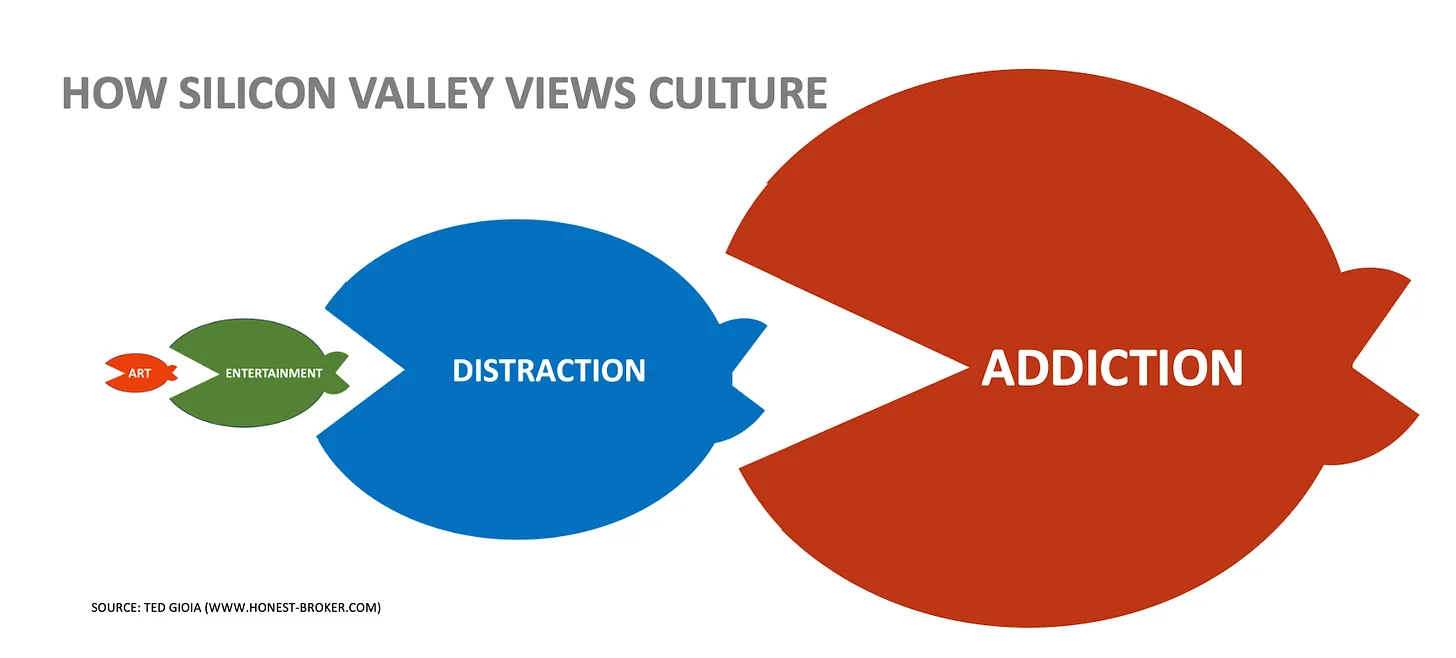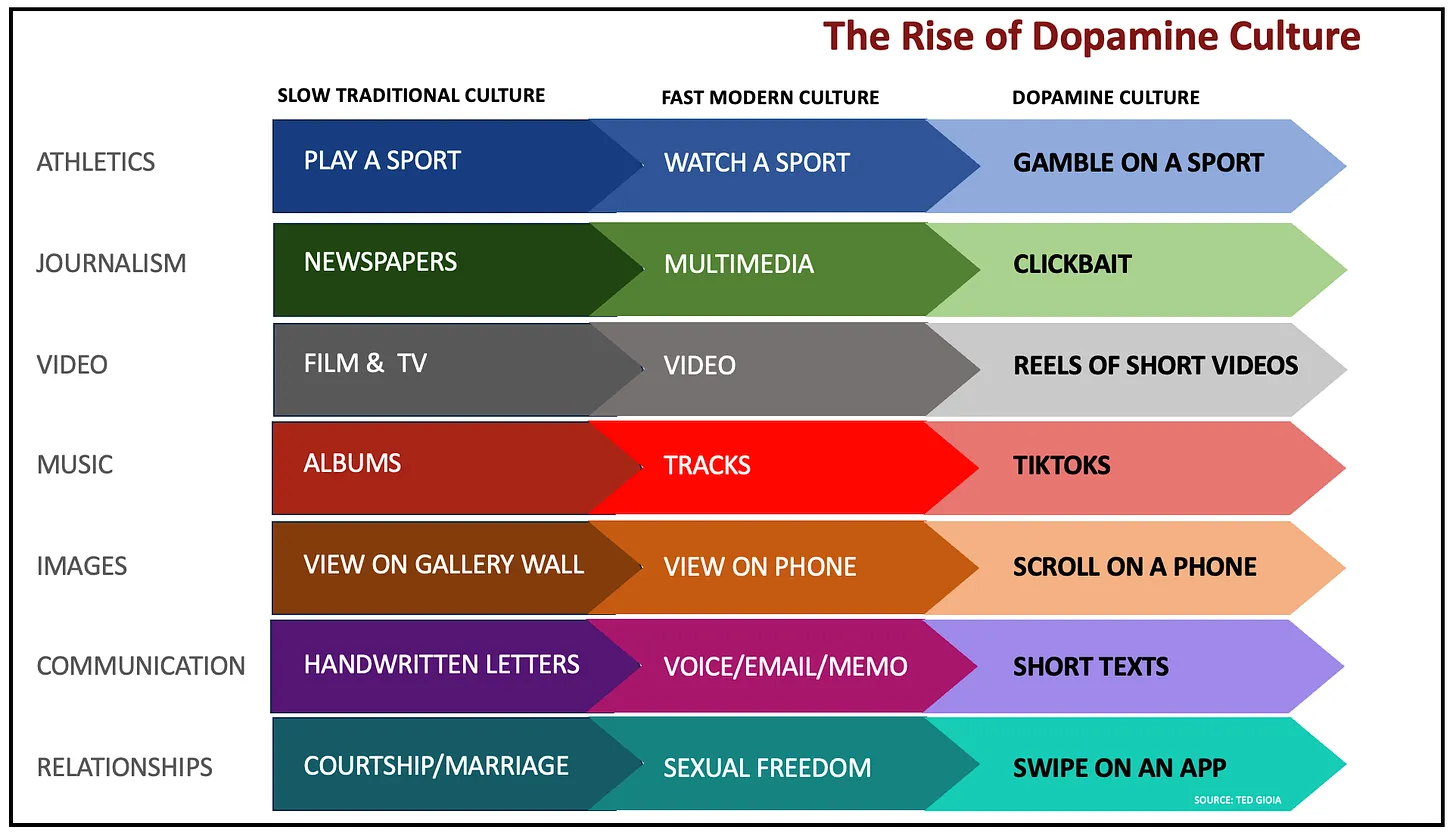Today’s random pick of 3 of my 12 favorite problems:
- How do I care for my soul amidst systems that constantly repress it?
- How can I be a teacher that I am proud of without living in fear of external validation?
- How can I keep working toward making the impact that I want without constantly second-guessing myself?
I learned about Ted Gioia’s The Honest Broker via Write of Passage. David described him admiringly as a cultural critic.
The State of the Culture 2024
The title of the article is so named to draw a parallel with the State of the Union address.
Ted makes a powerful argument that we are in a post-entertainment culture—an addiction driven culture.
The fastest growing sector of the culture economy is distraction. Or call it scrolling or swiping or wasting time or whatever you want. But it’s not art or entertainment, just ceaseless activity.
The key is that each stimulus only lasts a few seconds, and must be repeated.
It’s a huge business, and will soon be larger than arts and entertainment combined. Everything is getting turned into TikTok—an aptly named platform for a business based on stimuli that must be repeated after only a few ticks of the clock.

Despite tech CEOs knowing the mental health issues of the products they are providing, they push forward anyway.
The tech platforms aren’t like the Medici in Florence, or those other rich patrons of the arts. They don’t want to find the next Michelangelo or Mozart. They want to create a world of junkies—because they will be the dealers.
Addiction is the goal.
They don’t say it openly, but they don’t need to. Just look at what they do.
Everything is designed to lock users into an addictive cycle.
- The platforms are all shifting to scrolling and reeling interfaces where stimuli optimize the dopamine doom loop.
- Anything that might persuade you to leave the platform—a news story, or any outside link—is brutally punished by their algorithms. It might liberate you from your dependent junkie status, and that can’t be allowed.
- But wait, there’s more! Apple, Facebook, and others are now telling you to put on their virtual reality headsets—where you are swallowed up by the stimuli, like those tiny fish in my food chain charts. You’re invited to live as a passive recipient of make-believe experiences, like a pod slave in The Matrix.

Everything is gamified. Anything can be scrollable. You can simulate any boat you row.
But what does this do to our brains? To our lives? To the future?
Here’s where the science gets really ugly. The more addicts rely on these stimuli, the less pleasure they receive. At a certain point, this cycle creates anhedonia—the complete absence of enjoyment in an experience supposedly pursued for pleasure.
Ted discusses insights from Dopamine Nation by Dr. Anna Lembke.
I’ll admit that when I first started reading this article, I wasn’t sure whether it would connect to my favorite problems. I thought that as a cultural critic, Ted would mostly be talking about music and entertainment, but that he talks about our post-entertainment society and our addiction-driven culture ended up having a lot of connection with what’s on my mind all the time.
I’m scared of what things like social media might do to my daughter. One of my colleagues asked one day in a joking by grave way, “I’ll take vomiting toddlers, but how do I deal with a daughter who has cell phone addiction?” I’m scared of that happening to my daughter. This fear is a real part of me, in addition to being a teacher, that I don’t want to be divorced from my teaching life.
One of my favorite problems for today is about teaching: how do I continue going about my teaching life without burning out and still using it to cultivate meaning? Well, maybe I can bring into the classroom the science and the data behind the ideas here. The science and data behind the ideas in Dopamine Nation. When I was thinking about that book, I ended up thinking about how grateful I was that as a statistician, I am able to weave in these types of contexts that I’m interested in a natural way in my courses. Whereas other disciplines might have a harder time doing so. I thought about how, for example, this is often a bit harder in math classes. But then I remembered the book by Frances Su, Mathematics for Human Flourishing and it made me want to read that very soon.
So how do I care for my soul amidst systems that constantly repress it? And how can I keep working toward making the impact that I want without constantly second-guessing myself? Ted’s article today reminded me / reinforced for me that authenticity continues to be one of my top priorities and that something that is truly core to me is this fear of a loss of beauty that comes with a dopamine culture. I can care for my soul and work towards the impact that I want to have by raising awareness about these issues that I care about with my students, by embodying healthy habits for my daughter.